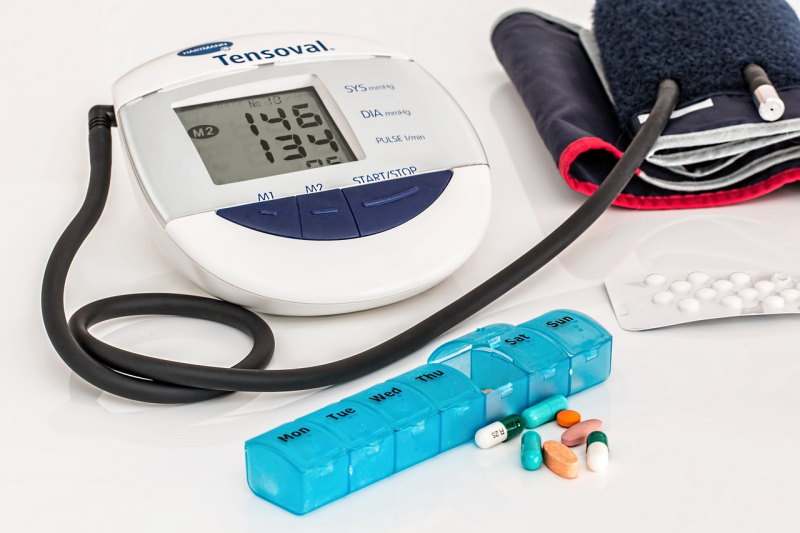Top 6 Things to Know About Ibuprofen
Ibuprofen is a nonsteroidal anti-inflammatory drug (NSAID) used to treat fever, pain, and inflammation. It's a nonsteroidal anti-inflammatory drug (NSAID). ... read more...Brufen, Genpril, Ibu-Tab, Cuprofen, Nurofen, Advil, and Motrin are some of the brand names for ibuprofen. A pharmacy's packaging will indicate whether a product contains ibuprofen. You can learn more about ibuprofen from this piece of information.
-
Ibuprofen is an NSAID, which is a type of medication that has analgesic, fever-reducing, and anti-inflammatory properties in higher doses.
Ibuprofen is on the World Health Organization's (WHO) list of essential medicines. The list specifies the bare minimum of medical requirements for a basic healthcare system.
Steroids and narcotics, also known as opioids, are other types of pain relievers. NSAIDs are safer than both of these, as long-term steroid use can have serious side effects, and opioid use can lead to misuse.
Ibuprofen, aspirin, and naproxen are well-known NSAIDs, thanks in part to their availability over the counter in pharmacies.
If taken orally, ibuprofen should start working within 20 to 30 minutes.
Photo by Brett Jordan on Unsplash 
Photo by Dan Dennis on Unsplash -
Ibuprofen can be taken orally as a syrup or tablet. They can also use it as a mousse, gel, or spray on the skin.
Uses include:
- fever
- inflammation
- headache
- menstrual pain
- the common cold
- toothache
- back pain
- arthritis
- sprains
Ibuprofen is added to some medications, such as decongestants, to create a combined cold or flu remedy.
Other medications combine ibuprofen with opioids like oxycodone. These are only for short-term use because they can be abused.

Photo by Polina Tankilevitch: https://www.pexels.com/photo/person-holding-thermometer-3873188/ 
Photo by Andrea Piacquadio: https://www.pexels.com/photo/shallow-focus-photo-of-woman-in-white-and-black-stripe-shirt-3808804/ -
Ibuprofen's gastrointestinal side effects are most typical. They consist of:
- pain
- diarrhea or constipation
- nausea and vomiting
- dyspepsia
- bloating
Other possible negative effects include:
- dizziness
- headache
- nervousness
- skin rash
- tinnitus
- edema, or fluid retention
After taking ibuprofen, a person should avoid driving or operating machinery if they feel lightheaded.

Photo by JESHOOTS.com: https://www.pexels.com/photo/woman-holding-half-full-glass-and-white-medicine-pill-576831/ 
Photo by Andrea Piacquadio: https://www.pexels.com/photo/young-man-in-sleepwear-suffering-from-headache-in-morning-3771115/ -
Ibuprofen is not recommended for people who have previously experienced an allergic reaction to aspirin or other NSAIDs, or who have recently had or will soon undergo heart surgery.
It may also be unsuitable for those who:
- are using other NSAIDs or pain relief medication
- are using anticoagulants
- are receiving treatment for any serious condition
- have chickenpox or shingles
- have Crohn’s disease or ulcerative colitis
- have liver problems
- have high blood pressure
- have heart disease
- have kidney disease
- are aged over 60 years
- have taken a diuretic
- have repeated stomach problems, such as heartburn or abdominal pain
- have stomach ulcers
- have bleeding problems
Before taking ibuprofen, people who are already taking any type of medication should consult with a healthcare professional. The Food and Drug Administration (FDA) updated its warning about the increased risk of heart attack or stroke when taking ibuprofen in 2015. Side effects may occur during the first few weeks of using this medication. The risk increases with higher doses, long-term use, or if a person has a history of heart disease. The FDA urges people to be aware of this potential issue and to get immediate medical help if they notice any of the following symptoms: chest pain, breathing problems, sudden weakness in one side or part of the body, or slurred speech. If a person is unsure whether to take ibuprofen, they should speak to a doctor or licensed pharmacist.
When to stop using it
People should stop taking ibuprofen and consult a doctor if they experience any of the following symptoms:
- fainting or blood in the vomit or stool pain that worsens or lasts more than 10 days
- a fever that worsens or lasts for more than three days
- any new symptoms, such as swelling or a change in skin color in the area of pain
Allergic reactions
Some people might be allergic to ibuprofen's ingredients. Among the allergic symptoms are:
- hives, change in skin color, blistering, or a rash
- facial swelling
- wheezing and difficulty breathing
- shock
Anyone exhibiting these signs should stop taking the medication. In extreme circumstances, a person may experience anaphylactic shock and have trouble breathing. This is a medical emergency that needs to be treated right away.
Pregnancy and nursing
Ibuprofen should not be used after 20 weeks of pregnancy because it can cause low levels of amniotic fluid.
Before taking any medication during pregnancy or while nursing, a person should consult with a healthcare professional.Is ibuprofen addictive?
Ibuprofen is not typically thought of by experts as a drug that will cause substance use disorder, but at least one case study suggests that it might.
It does not cause tolerance in the body, so a person won't require higher doses to achieve the same effect. When someone stops using it, there are no withdrawal symptoms either.
Ibuprofen and opioids, such as hydrocodone or oxycodone, are both present in some medications. Substance use disorder can result from the excessive use of these drugs.
Photo by mohamed_hassan on Pixabay 
Photo by Robina Weermeijer on Unsplash -
One medication can sometimes interfere with the effects of another. This is referred to as drug interaction by experts. Ibuprofen may interact with the following medications:
- lithium
- warfarin
- oral hypoglycemics
- high dose methotrexate
- medication for lowering blood pressure
- angiotensin-converting enzyme inhibitors
- beta-blockers
- diuretics
This is not a complete list of drugs that interact with ibuprofen. Anyone considering taking ibuprofen should consult with a pharmacist or doctor to ensure that it is compatible with their current medication.

Photo by stevepb on Pixabay 
Photo by Kristine Wook on Unsplash -
Both tablet and syrup forms of ibuprofen are widely accessible. To treat pain after surgery, doctors may also inject it into the patient.
The dosage will vary depending on the patient's age and the reason they are taking ibuprofen. To reduce the risk of side effects, it is critical to take the recommended dosage.
To lessen the chance of an upset stomach, it is best to take it with food or a glass of milk.
A person can take 400 milligrams (mg) every 4-6 hours for mild to moderate pain. 3,200 mg is the maximum dose per day.
A medical professional will advise the dosage for other uses. Additionally, they will keep an eye out for any negative side effects and change the dose as necessary.
Ibuprofen and children
Pediatric ibuprofen can be used to treat pain and fever in children.
Children's doses are lower than those of adults. According to research, dose levels should be based on a child's weight and age.
Before giving ibuprofen to a child, parents should consult with a doctor if the child is:
- under 2 years of age or weighs less than 24 pounds
- taking any other medication
- receiving treatment for a serious health condition

Photo by Brett Jordan on Unsplash 
Photo by Towfiqu barbhuiya on Unsplash








